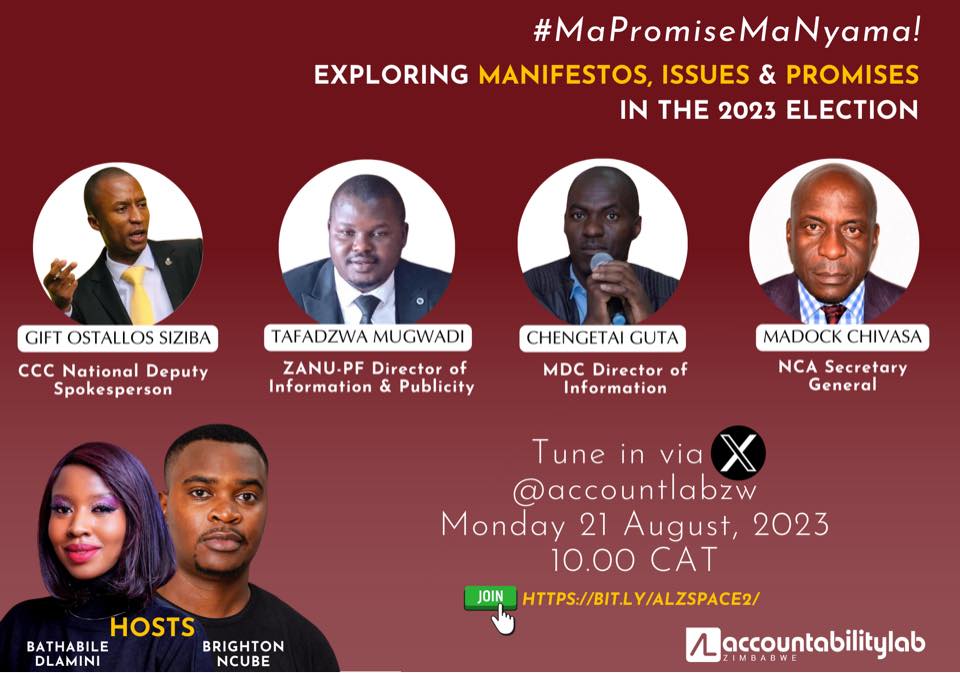NEWS

IN BRIEF
Accountability Lab Zimbabwe has recently introduced #ALZSpace a conversation and debate […]
SHARE
Accountability Lab Zimbabwe has recently introduced #ALZSpace a conversation and debate series on X (formerly Twitter). The discussions seek to promote dialogue about accountability and governance issues. The second episode of the series of conversations explored election manifestos, issues, and promises from political parties contesting the 2023 general elections.
During the discussion, several political parties, including the Citizens Coalition for Change, the Movement for Democratic Change, and the National Constitutional Assembly, presented the key points from their party manifestos. However, in Zimbabwe, particular concerning patterns have emerged over the past several decades in which men dominate political contests, marginalized communities are excluded from the discourse, and parties’ proposals are not rooted in the realities of every life as represented by data or facts. This article aims to examine these flaws as illustrated by the #ALZSpace, why they exist, and highlight the urgent need for change and progress.
One pressing issue within Zimbabwe’s political landscape is the prevalence of manels, that is, discussions about the context or an issue of national importance in which the panel of experts or participants consists only of non-disabled older men. Despite the significance of women, young people, and people with disabilities comprising a substantial majority population, their voices are often marginalized or go unheard in public fora. This significant imbalance perpetuates a cycle of male-centered decision-making, resulting in policies that inadequately address the diverse needs of Zimbabwean society. The lack of adequate representation is evident in the party’s selection of spokespersons during the discussion on the manifestos, issues, and promises of the 2023 elections. All the parties participating in the debate forwarded a non-disabled older male spokesperson to represent them.
It is crucial to advocate for increased representation and participation of women in shaping the electoral agenda. Political parties gain valuable perspectives by actively involving women in panel discussions and ensuring a fair representation of the population’s realities and concerns.
Another glaring issue lies in the formulation of election manifestos. The concerns and realities of marginalized communities, including women, young people, the rural population, and people with disabilities, who comprise most of the population, are excluded in political party election manifestos. These communities face significant challenges and have specific needs. Further, the manifestos did not display a minority-centric approach towards including neglected populations. Politimake concerted efforts to engage with these communities, actively seeking their input and reflecting their concerns within their manifestos. By doing so, political parties can demonstrate their commitment to building an inclusive society that prioritizes the needs of all citizens.
Compounding this challenge is the articulation of national aspirations and policy agendas in very general and broad terms. The manifestos presented did not draw from available data about Zimbabweans, which continues to be a significant shortcoming in Zimbabwe’s political landscape. It is not enough for political parties to rely on vague promises and slogans. Instead, manifestos must be based on concrete data, addressing the current realities and challenges faced by the nation. Political parties must comprehensively understand the country’s needs, demonstrated by incorporating specific statistics, such as poverty rates, unemployment figures, educational indicators, and healthcare data. This intellectual investment in understanding the lived realities of Zimbabweans demonstrates aspiring representatives’ desire to bring about concrete change informed by a sound understanding of the context. This approach also helps voters to make informed decisions, leading to more effective policies and credible governance.
Having presented the flaws within Zimbabwe’s election manifestos, one can’t help but wonder, what are citizens voting for? Manifestos were presented and rolled out late, limiting how much time citizens could spend understanding them. The flaws in manifestos hinder the development of a democratic, responsive, and inclusive political landscape. To be credible, parties must make concerted efforts to address these issues. By promoting gender equality in panel discussions, engaging marginalized communities, and crafting manifestos based in reality, political parties can contribute towards meaningful change and progress. Moreover, the timeous roll-out of manifestos by citizens can ensure that citizens vote not by rote, through loyalty to party symbols, but by belief in what a political party stands for and the accurate manner in which their manifesto articulates their promises.
Citizens must actively hold political parties accountable, demanding more excellent representation, inclusivity, and evidence-based policies. By doing so, Zimbabwe can move towards a brighter and more equitable future, where manifestos genuinely reflect the needs and aspirations of its diverse population.
—-
Bathabile Dlamini – Media and Communications Officer
